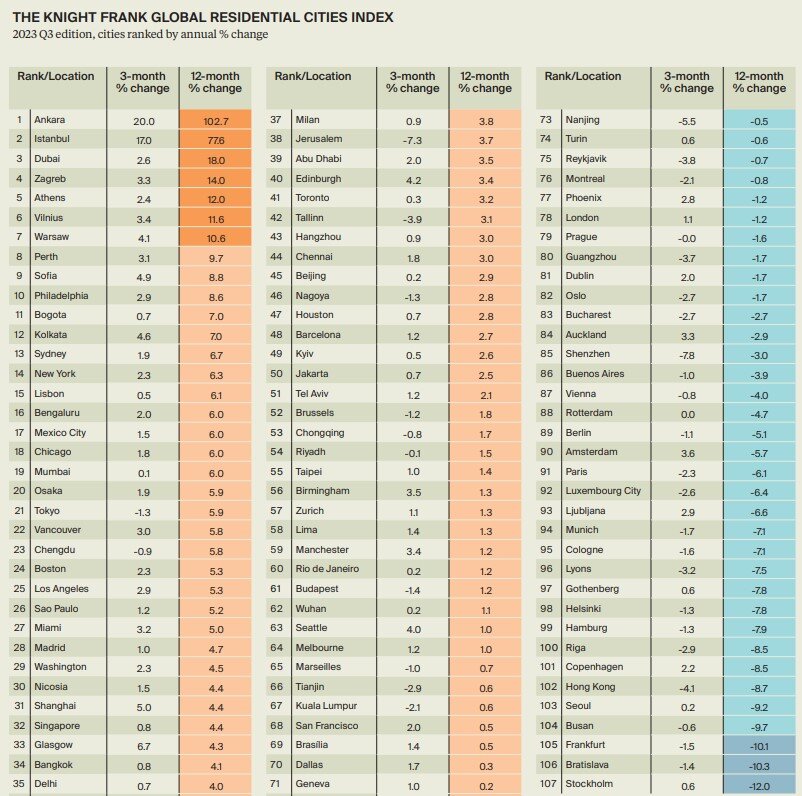Residential Real Estate News

Global Cities Residential Price Growth Recovers as Interest Rate Cuts Begin
Residential News » Istanbul Edition | By Michael Gerrity | January 5, 2024 9:33 AM ET
According to property consultant Knight Frank, global housing markets continue to display healthy price growth in late 2023, despite the record rise in interest rates since late 2021. Across our basket of world cities, average prices only experienced a decline on a quarterly basis in the final quarter of 2022, after which prices have risen by 2.7%.
The fundamental pillars supporting these prices remain: low stock availability, above-inflation wage growth, elevated household savings, and limited new-build construction. These factors collectively contribute to maintaining prices at levels that are stretching traditional affordability metrics, especially with the rising cost of debt.
Turkish cities once again occupy the top two spots, showcasing the strongest annual growth in our rankings at 102.7% (Ankara) and 77.6% (Istanbul). Dubai secures the third position, while European markets Zagreb and Athens claim the final spots in our top five.
At the bottom of Knight Frank's rankings, European markets face tougher conditions, with Stockholm, Bratislava, and Frankfurt all experiencing double digit annual price declines.

Liam Bailey, Knight Frank's global head of research said, "Homeowners are breathing a sigh of relief as interest rates appear poised to decrease in 2024. While this is positive news for those worried about transitioning to higher-rate mortgage deals, it's important to acknowledge that interest rates are expected to stabilize at levels higher than those homebuyers grew accustomed to during the pandemic. With prices starting to rise again, the risk of potential future price declines lingers due to the ongoing stretched affordability."
What's changed?
With prices rising for successive quarters, it is fair to ask whether the much-heralded housing market downturn is over. While the aforementioned supports will continue to underpin pricing into 2024, most key city housing markets are still grappling with stretched affordability.
Consequently, many prospective homebuyers are compelled to enter the rental market due to insufficient deposits and the prospect of high mortgage repayments.
Despite the recovery in price growth, several pressures will impede a more sustained housing market recovery, including a revival in housing market transactions. Chief among these obstacles are higher mortgage servicing costs. Although mortgage rates are expected to edge down in 2024 due to anticipated policy rate cuts in the US, Europe, and other regions, the cost of debt will settle notably higher than pre-pandemic levels. This factor will further exacerbate affordability pressures for households transitioning from previously agreed cheaper deals in recent years, says Knight Frank.
Sign Up Free | The WPJ Weekly Newsletter
Relevant real estate news.
Actionable market intelligence.
Right to your inbox every week.
Real Estate Listings Showcase
Related News Stories
Residential Real Estate Headlines
- Las Vegas Area Home Prices Uptick 4.3 Percent Annually in March
- Single-Family Rent Growth in U.S. Trends Upward in 2025
- U.S. Mortgage Rates Tick Down Post Trump Tariffs Commencement
- President Trump's 'Liberation Day' Tariffs Potential Impact on the U.S. Housing and Mortgage Markets
- Baby Boomers Biggest Cohort of U.S. Home Buyers in 2025 as Millennials Decline
- U.S. Monthly Housing Payments Hit Record High in 2025
- U.S. Pending Home Sales Uptick in February
- Global Prime Residential Rent Slowdown Continued in Late 2024
- Ireland Home Price Inflation Hits 8 Year High in Early 2025
- Existing Home Sales in America Uptick in February
- Great Miami Area Residential Sales Decline 15 Percent Annually in February
- Mortgage Rates Uptick in Mid-March, Ending 9-Week Decline in U.S.
- World Property Ventures Builds the Future of Real Estate with New Funding Round
- U.S. Builder Sentiment Declines Amid Economic Uncertainty and Rising Costs
- Black Homeownership Rates in U.S. Enjoy Largest Annual Increase of All Racial Groups
- Wealthy Renters Are Taking Over More of the U.S. Rental Market
- If U.S. Congress Does Not Extend NFIP Soon, Thousands of Daily Home Closings Impacted
- U.S. Mortgage Applications Spike 11 Percent in Early March
- Greater Palm Beach Area Residential Sales Rise in Early 2025
- New Apartments in U.S. Are Leasing at Slowest Pace on Record
- U.S. Mortgage Rates Drop to 4 Month Low in March
- Overall U.S. Mortgage Delinquency Rates Dip in December
- New Tariffs on Canada, Mexico to Impact U.S. Homebuilder Input Costs
- Monaco's Property Market: A Tale of Two Cities
- U.S. Home Purchase Cancellations Surge, 1 in 7 Sales Getting Canceled
- U.S. Pending Home Sales Hit Historic Low in Early 2025
- Greater Miami Area Residential Sales Dip in January
- Governor DeSantis Supports Ending Property Taxes in Florida
- WPV Aims to Become the Berkshire Hathaway of Real Estate Tech
- U.S. Home Sales Slump Continues in January
- Average Americans Spend 38 Percent of Monthly Income on Mortgage Payments
- Switzerland's Safe-Haven Appeal Grows with World's Wealthy Homebuyers
- U.S. Builder Confidence Rapidly Declines in February
- Las Vegas Home Sales Rise 6.7 Percent Annually in January, Condo Sales Dip
- Homebuyer Demand in America Drops to 5-Year Low in Early 2025
- Ownership More Affordable Than Renting in Most U.S. Markets
- The World's First Global Listings Service Launches, Called a GLS
- Home Prices Continue to Rise in 89 Percent of U.S. Metros in Late 2024
- Global Luxury Residential Prices Showed Gradual Improvement in Late 2024
- U.S. Construction Hiring Rate Drops to Lowest Levels in 5 Years






